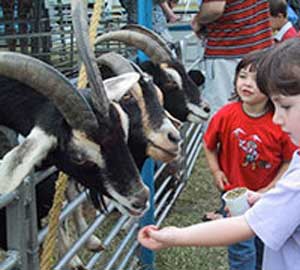Petting Zoos and other exhibits where contact with animals is permitted can be the source of E.coli poisoning which can cause serious, sometimes life-ending illness for children. Before taking the family out to the fair or the petting zoo, parents should be aware of the risks that these exhibits pose.
 Recently there have been a number of E.coli outbreaks linked to petting zoos including the one last summer linked to the Cleveland County Fair in North Carolina that sickend 106 people. Sixty-four of them were children, one of whom died.
Recently there have been a number of E.coli outbreaks linked to petting zoos including the one last summer linked to the Cleveland County Fair in North Carolina that sickend 106 people. Sixty-four of them were children, one of whom died.
This outbreak came just a year after one linked to the North Carolina State Fair in Raleigh that sickened 25 people, four of whom developed hemolytic uremic syndrome (HUS) which can cause kidney failure, seizure, stroke and coma. And one in 2004, again linked to the North Carolina State Fair petting zoo, that sickened 187, 15 of whom developed HUS.
Other examples include: the Fond du Lac County Fair, Wisconsin , 2011 where an 18-month old was hospitalized with an E. coli infection after attending the fair; the Hendricks County Fair, Indiana, 2011, where a five-year-old girl died of an E. coli infection after attending the fair, the Northwestern Michigan Fair, 2010 where three children who attended the fair contracted E. coli poisoning and the Rush County Fair, Indiana, 2010 where a four-year-old girl was hospitalized with HUS after attending the fair.
E.coli is a bacteria that lives in the intestines of animals and is shed in their feces. Microscopic amounts of feces can get on animals’ fur and then be transfered on to the hands of children who pet them and then touch their faces, food, pacifiers, bottles or sippy cups. Thorough handwashing can prevent illness, but only if it is done after the child pets the animal and before he or she touches anything else. And only if the soap dispensers at the exhibits are full. On the day a child who died from E.coli complications visited the Cleveland County fair, the soap dispenser nearest the petting zoo exit was empty.
“These events are a well recognized source of E. coli poisoning and have been implicated in several outbreaks in recent years,” said Fred Pritzker, publisher of Food Poisoning Bulletin and food safety attorney who has represented families who children have been sickened and died from E.coli complications after visiting petting zoos. “Despite the frequency and severity of these outbreaks, not enough is being done to prevent these severe injuries to children, who are particularly vulnerable to E. coli poisoning and the horrible condition that frequently develops from it, (HUS).”
The Centers for Disease Control and Prevention (CDC) recommends that children under five not be allowed to handle live animals and children older than that do so with adult supervision. Public health officials remind fairgoers to look for functioning handwashing stations before attending an animal exhibit. Alcohol-based hand sanitizer is not an effective substitute for handwashing.




